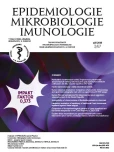-
Medical journals
- Career
Fecal bacteriotherapy in the treatment of Clostridium difficile infection
Authors: R. Stebel 1,2; R. Svačinka 1,2; L. Vojtilová 1,2; M. Freibergerová 2; P. Husa 1,2
Authors‘ workplace: Lékařská fakulta Masarykovy Univerzity, Brno 1; Klinika infekčních chorob, Fakultní nemocnice Brno 2
Published in: Epidemiol. Mikrobiol. Imunol. 67, 2018, č. 3, s. 104-109
Category: Original Papers
Overview
Aim:
Using a prospective analysis to assess the success of faecal bacteriotherapy (FBT) in antibiotic-associated colitis due to Clostridium difficile. To analyse whether any of the factors according to which the treated patients can be categorized has a statistically significant effect on the therapeutic outcome.
Materials and methods:
During the 2-year study period (2015–2016), 71 patients received FBT. After treatment, the patients were followed up by means of clinic visits or by phone. If colitis did not recur within eight weeks of follow-up, the treatment was considered successful.
Results:
The overall success rate was 76%, with statistically insignificant decline in recurrences. Subgroup analysis did not show any statistically significant difference in the success rate between the routes of administration, i.e. through a naso-enteral feeding tube and rectal enema. Likewise, there were no statistically significant differences in the success rate between the types of prior antibiotic therapy or between using fresh and cryo-stored stool suspension. No unexpected adverse event or lethality occurred during the study period.
Conclusions:
Faecal bacteriotherapy is a successful and safe therapeutic alternative for recurrent C. difficile infections.
KEYWORDS:
faecal bacteriotherapy – recurrent Clostridium difficile colitis – intestinal microbiome
Sources
1. Bielaková K, Kubešová H, Weber P. Úskalí antibiotické terapie s ohledem na střevní záněty. Medical Tribune, 2012;8(7),C3–C3.
2. Vojtilová L. Rizikové faktory rekurentního a těžkého průběhu kolitidy vyvolané infekcí Clostridium difficile. Brno, 2014. Disertační práce. Lékařská fakulta, Masarykova univerzita.
3. Al-Jashaami LS, Dupont HL. Management of Clostridium difficile Infection. Gastroenterology & Hepatology, 2016;12(10):609–616.
4. Beneš J, Husa P, Nyč O, et al. Doporučený postup diagnostiky a léčby kolitidy vyvolané Clostridium difficile. Postgraduální gastroenterologie & hematologie, 2015;1(4):304–313.
5. Yacyshyn B. Pathophysiology of Clostridium difficile – Associated Diarrhea. Gastroenterology & Hepatology, 2016;12(9):558–560.
6. Kohout P, Vejmelka J. Fekální bakterioterapie v léčbě recidivující klostridiové enterokolitidy. Postgraduální medicína, 2014;16(7):729–734.
7. Gens KD, Elshaboury RH, Holt JS. Fecal Microbiota Transplantation and Emerging Treatments for Clostridium difficile Infection. Journal of Pharmacy Practice, 2013;26(5):498–505.
8. Hota SS, Sales V, Tomlinson G, et al. Oral Vancomycin Followed by Fecal Transplantation Versus Tapering Oral Vancomycin Treatment for Recurrent Clostridium difficile Infection: An Open-Label, Randomized Controlled Trial. Clinical Infectious Diseases, 2016;64(3):265–271.
9. Polák P, Freibergerová M, Juránková J, et al. První zkušenosti s fekální bakterioterapií v léčbě relabující pseudomembranózní kolitidy způsobené Clostridium difficile. Klinická mikrobiologie a infekční lékařství, 2011;17(6):214–217.
10. Debast SB, Bauer MP, Kuijper EJ. European Society of Clinical Microbiology and Infectious Diseases: update of the treatment guidance document for Clostridium difficile infection. Clinical Microbiology and Infection, 2014;20 : 1–26.
11. Polák P, Freibergerová M, Husa P, et al. Fekální bakterioterapie v léčbě rekurentní kolitidy způsobené Clostridium difficile na Klinice infekčních chorob Fakultní nemocnice Brno v letech 2010–2014 – prospektivní studie. Epidemiologie, mikrobiologie, imunologie, 2015;64(4):232–235.
12. Jalanka J, Mattila E, Jouhten H, et al. Long-term effects on luminal and mucosal microbiota and commonly acquired taxa in faecal microbiota transplantation for recurrent Clostridium difficile infection. BMC Medicine, 2016;14(1):155.
13. Satokari R, Mattila E, Kainulainen V, et al. Simple faecal preparation and efficacy of frozen inoculum in faecal microbiota transplantation for recurrent Clostridium difficile infection-an observational cohort study. Alimentary Pharmacology & Therapeutics, 2015;41(1):46–53.
14. Li YT, Cai HF, Wang ZH, et al. Systematic review with meta-analysis: long-term outcomes of faecal microbiota transplantation for Clostridium difficile infection. Alimentary Pharmacology & Therapeutics, 2016;43(4):445–457.
15. Cammarota G, Ianiro G, Gasbarrini A. Fecal microbiota transplantation for the treatment of Clostridium difficile infection: a systematic review. Journal of clinical gastroenterology, 2014;48(8):693–702.
16. Lee CH, Steiner T, Petrof E, et al. Frozen vs fresh fecal microbiota transplantation and clinical resolution of diarrhea in patients with recurrent Clostridium difficile infection: A randomized clinical trial. JAMA, 2016;315(2):142–149.
17. Youngster I, Sauk J, Pindar Ch, et al. Fecal Microbiota Transplant for Relapsing Clostridium difficile Infection Using a Frozen Inoculum From Unrelated Donors: A Randomized, Open-Label, Controlled Pilot Study. Clinical Infectious Diseases: An Official Publication of the Infectious Diseases Society of America, 2014;58(11):1515–1522.
18. Li N, Tian H, Ma Ch, et al. Efficacy analysis of fecal microbiota transplantation in the treatment of 406 cases with gastrointestinal disorders. Chinese journal of gastrointestinal surgery, 2017;20(1):40–46.
Labels
Hygiene and epidemiology Medical virology Clinical microbiology
Article was published inEpidemiology, Microbiology, Immunology

2018 Issue 3-
All articles in this issue
- Molecular characterization of Streptococcus pneumoniae isolates recovered from cases of pneumococcal vaccine failure in children under five years of age in the Czech Republic in 2012–2014
- Fecal bacteriotherapy in the treatment of Clostridium difficile infection
- Successful rituximab treatment of granulomatous/lymphocytic interstitial lung disease in common variable immunodeficiency
- Human rotavirus A detection: Comparison of enzymatic immunoassay and rapid chromatographic test with two quantitative RT-PCR assays
- Human Mozdok leptospirosis first diagnosed by serum agglutinin-absorption tests in the Slovak Republic
- Susceptibility of clinical isolates of Bordetella pertussis to chemicals
- Laboratory evaluation of repellency of traditional Czech homemade repellents against Aedes aegypti
- Comparison of the epidemiological patterns of Lyme borreliosis and tick-borne encephalitis in the Czech Republic in 2007–2016
- Epidemiology, Microbiology, Immunology
- Journal archive
- Current issue
- Online only
- About the journal
Most read in this issue- Comparison of the epidemiological patterns of Lyme borreliosis and tick-borne encephalitis in the Czech Republic in 2007–2016
- Fecal bacteriotherapy in the treatment of Clostridium difficile infection
- Successful rituximab treatment of granulomatous/lymphocytic interstitial lung disease in common variable immunodeficiency
- Susceptibility of clinical isolates of Bordetella pertussis to chemicals
Login#ADS_BOTTOM_SCRIPTS#Forgotten passwordEnter the email address that you registered with. We will send you instructions on how to set a new password.
- Career

